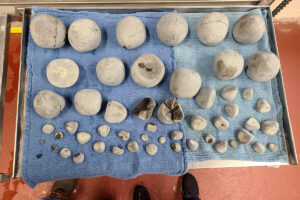Antibody Prevalence
Horses can get the potentially severe and fatal disease coccidioidomycosis from the fungus Coccidioides immitis, which grows in portions of California, Arizona, New Mexico, Texas, and Utah. However, researchers recently discovered that
- Topics: Article, National & U.S. Legalities
Horses can get the potentially severe and fatal disease coccidioidomycosis from the fungus Coccidioides immitis, which grows in portions of California, Arizona, New Mexico, Texas, and Utah. However, researchers recently discovered that just because a horse has been exposed (determined when a horse has antibodies against C. immitis doesn’t mean it will become sick.
C. immitis is a saprophytic (feeding or growing upon decaying animal or vegetable matter) soil fungus that is endemic in some sandy, alkaline soils in the United States. Some clinical signs of coccidioidomycosis in horses are interstitial pneumonia, osteomyelitis, mastitis, abortion, and the development of superficial and internal abscesses. The disease can be severe and fatal, but its frequency is low.
During her residency, Jill C. Higgins, DVM, (now at Loomis Basin Large Animal Services in Loomis, Calif.) and colleagues from the Arizona Equine Medical and Surgical Center in Gilbert, Ariz., worked with a researcher at the University of California, Davis, to determine the seroprevalence of C. immitis in 197 healthy horses undergoing routine preventive care in the counties of Maricopa and Pinal, Ariz. They also wanted to determine how to interpret titer values (antibody levels) obtained from horses (with or without signs of coccidioidomycosis) and try to better understand the epidemiology of the disease to allow for earlier diagnosis and treatment.
“Serum antibodies against C. immitis were detected in eight of 197 horses (seroprevalence 4.06%),” wrote the authors. “Results of serologic assays were positive in seven horses for IgG antibodies and negative for IgM antibodies (IgM shows more recent exposure), and positive for both IgG and IgM antibodies in one horse
Create a free account with TheHorse.com to view this content.
TheHorse.com is home to thousands of free articles about horse health care. In order to access some of our exclusive free content, you must be signed into TheHorse.com.
Start your free account today!
Already have an account?
and continue reading.

Related Articles
Stay on top of the most recent Horse Health news with

















